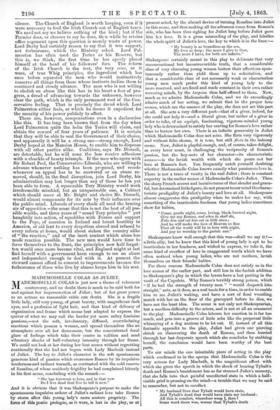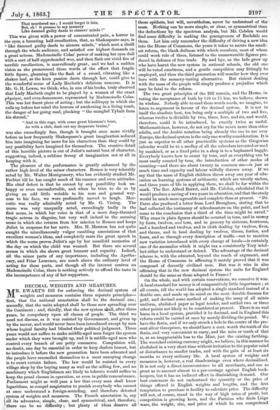MADEMOISELLE COLAS AS JULIET.
MADEMOISELLE COLAS is just now a theme of vehement controversy, and no doubt there is much to be said both for and against her impersonation of Juliet ; but of her great power as an actress no reasonable critic can doubt. She is a fragile little lady, still very young, of great beauty, with magnificent dark eyes, and a profusion of light hair, and that kind of delicacy of organization and frame which seems best adapted to express the quiver of what we may call the harder yet more sultry feminine passions,—not the soft, involuntary, diffused, overwhelming emotions which possess a woman, and spread themselves like an atmosphere over all her demeanour, but the concentrated focal glare of feelings which take their centre in volition and send vibratory shocks of half-voluntary intensity through her frame. We could not look at her during her best scenes without regretting continually that she had not begun with Lady Macbeth instead of Juliet. The key to Juliet's character is the soft spontaneous generous kind of passion which overcomes Romeo by its impulsive tenderness and radiant warmth, as contrasted with the cold reserve of Rosaline, of whose maidenly frigidity he had complained bitterly in his first scene, concluding with the remark:— " She has forsworn to love, and in that vow
Do I live dead that live to tell it now."
And it is obvious that it was Shakespeare's purpose to make the spontaneous impulsive ardour of Juliet's radiant love take Borneo by storm after this young lady's more austere propriety. The force of this poetic prologue, as it were, is lost in the play; as at present acted, by the absurd device of turning Rosaline into Juliet, in this scene, and thus making all the advances come from Romeo's
side, who has been thus sighing for Juliet long before Juliet gave him her love. It is a gross misreading of the play, and falsifies.
the whole spirit of Juliet's love, the key to which is in the linos :--
"My bounty is as boundless as the sea,
My love as deep; the more I give to thee, The more I have, for both are infinite."
Shakespeare certainly meant in this play to delineate that very unconventional but incontrovertible truth, that a considerable-
class of very charming young women bestow their affections spon- taneously rather than yield them up to solicitation, and that a considerable class of not necessarily weak or characterless. young men much prefer this kind of young lady to the more reserved, and are fixed and made constant in their own rather
wavering minds, by the largesse thus half-offered to them. Now, much as we admire Mademoiselle Colas, and we do exceedingly- admire much of her acting, we submit that in the proper love- scenes, which are the essence of the play, she does not act this part, at all. She acts a very different part—that of a giver, indeed, for- she could not help it—and a liberal giver, but rather of a giver in. order to take, of an espagle, fascinating, vigorous-minded young lady who is determined to satisfy her craving for Romeo's love rather- than to bestow her own. There is an infinite generosity in Juliet scene. Now, Juliet is playful enough, and, of course, takes delight, as every lover must, in challenging the reciprocity of Romeds. passion, but the key-note of her character—its characteristic nuance—is the lavish wealth with which she pours out her love at Romeo's feet. You frequently catch yourself doubting whether Mademoiselle Colas knows exactly what passionate love is..
There is not a trace of vanity in the real Juliet ; there is constant.
coquetry in the earlier scenes of Mademoiselle Colas's Juliet. Them the sharp French accent and incisiveturns of that slender and grace- ful, but determined little figure, do not present to our mind the charac-
teristic prodigality of Juliet's beauty and love at all. Shakespeare- almost exaggerates this prodigality when he makes her say, with something of the inarticulate fondness that young ladies sometimes. show for babies,
"Come, gentle night, come, loving, black-browed night, Give me my Romeo, and when he shall die, Take him and cut him out in little stars; And he will make the face of Heaven so fine That all the world will be in love with night, And pay no worship to the garish sun."
Shakespeare knew well enough that this was—shall we say it?— a little silly, but he knew that this kind of young lady is apt to be- inarticulate in her fondness, and wished to express, we take it, the same kind of overflow of love in exaggerated words which we have- often noticed when young ladies, who are not mothers, lavish themselves on their friends' babies.
For these reasons Mademoiselle Colas does not satisfy us in the- love scenes of the earlier part, and still less in the foolish addition. to Shakespeare's play in which the lovers have a last parting in the vault of the Caplets. Why Romeo's terribly strong poison, which "if he had the strength of twenty men" "would despatch himi straight,' acts, as it does, as a real tonic for a time, in order to enable him to see Juliet's waking, and have a sort of final wrestling
match with her on the floor of the graveyard before he dies, we have not the least idea. The scene is not only not Shakespearian, but a needless difficulty to the actors, and is not at all an ornament to the play. Mademoiselle Colas labours her emotion in it far too much, and gets into a groove of little sobs like the perpetual little- whinnying of a dog anxious to be let out. If, instead of all this.
fantastic appendix to the play, Juliet had given one piercing. shriek on discovering the death of Romeo, and then hurried through her last desperate speech which she concludes by stabbing herself, the conclusion would have been worthy of the best parts.
To our minds the one inimitable piece of acting in the play which confirmed us in the opercu that Mademoiselle Colas is the very actress for Lady Macbeth, is the magnificent effect with which she gives the speech in which the shock of hearing Tybalts. death and Romeo's banishment has so far stunned Juliet's memory, that she falls into that painful uncollected state in which a half- visible grief is pressing on the mind—a trouble that we may be said to remember, but not to recollect.
"My husband lives that Tybalt would have slain, And Tybalt's dead that would have slain my husband: All this is comfort, wherefore weep I, then Some word there was, worser than Tybalt's death
That murdered me ; I would forget it fain, But, oh ! it presses to my memory Like damned guilty deeds to sinners' minds !"
This was given with a power of concentrated pain, a horror in the eyes, a haunting half-recollection, that, as Shakespeare says, is "like damned guilty deeds to sinners minds," which sent a thrill through the whole audience, and satisfied our highest demands on a great actress. Mademoiselle Colas' power of making her eyes dull with a sort of half-apprehended woe, and then flash out vivid fire of terrible recollection, is marvellously great, and we had a sudden vision as she pronounced these words of the effect that fragile little figure, gleaming like the flash of a sword, vibrating like a shaken leaf, as the keen passion darts through her, could give to the wonderful scene of Lady Macbeth's delirious remorse. It is Mr. G. H. Lewes, we think, who, in one of his books, truly observed that Lady Macbeth ought to be played by a woman of the exact physique, and even demeanour, represented by Mademoiselle Colas. This was her finest piece of acting ; but the soliloquy in which she calls up before her mind the horrors of awakening in a living tomb, the danger of her going mad, plucking "the mangled Tybalt from his shroud,"
"And in this rage, with some great kinsman's bone, As with a club, dash out my desperate brains," was also exceedingly fine, though it brought once more vividly before us how frequently Shakespeare's great imagination seduced him into imagining far more for his characters than they could by any possibility have imagined for themselves. The creative detail of this horrible picture is out of Juliet's natural beat of character, suggesting, indeed, a sublime frenzy of imagination not at all in keeping with it.
The pleasure of the performance is greatly enhanced by the rather high level of the minor characters. Romeo is very tolerably acted by Mr. Walter Montgomery, who has evidently studied Mr. Fechter till he has caught much of his manner and even attitudes. His chief defect is that he cannot by any possibility look un- happy or even uncomfortable, and when he tries to do so by giving an odd little wrinkle to his nose and general wry- ness to his face, we were profoundly moved to laugh. Mer- cutio was really admirably acted by Mr. G. Vining. The nurse was very unequally acted, exceedingly badly in the first scene, in which her voice is that of a mere deep-throated tragic actress in disguise, but very well indeed in the amusing scene in which she returns from her mission to Romeo and keeps Juliet in suspense for her news. Mrs. H. Marston has not quite caught the miscellaneously vulgar rambling associations of that excellent woman's ideas, and completely mars the great speech in which the mirk proves Juliet's age by her manifold memories of the day on which the child was weaned. But there are several scenes in which she shows great humour and capacity. Indeed, all the minor parts of any importance, including the Apothe- cary, and Friar Laurence, are much above the ordinary level of acting for those parts, and though all the interest centres on Mademoiselle Colas, there is nothing actively to offend the taste in the incompetence of any of her supporters.































 Previous page
Previous page